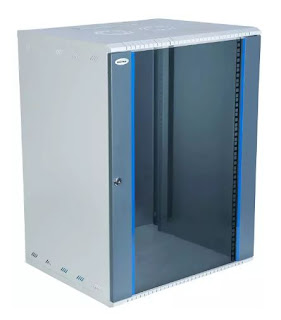Network/Server Rack:
Today we will discuss one of the important item in networking environment i.e. network rack.
A network
rack is a chassis or a frame or an enclosure made of metal that holds and
organizes computer network devices such as switches, routers, storages, servers
etc. Racks come with doors and lock to prevent unauthorized access.
One of the advantages of rack mounting is that several devices
can be placed into one place to manage it effectively.
A typical
full stack rack size is 42U, which is around 6ft height. Other sizes come as
36U, 29U etc.
If we
calculate the length of U in a rack (Vertical) way it will be, 1U = 44.45mm =
1.75 inch
Similarly average
racks comes with widths such as 36’,42’, 50’.
Many racks
come with fully assembled and some in open to assemble later at your place.
Small size racks come for rack mounting.
These racks
come with other accessories such as patch panel, power distribution unit (PDU),
clamps, bolts, cooling fans etc. They also provide cable management and allow
optimized airflow for increased operational efficiency and extended equipment
life.
Patch Panel
A patch panel
is there to manage the cables in the network rack. They come with multiple jacks that connect cables and route them
where they need to go. With help of proper cable labeling or tagging,
all the cables should be terminated at patch panel. The labeling can not only
save lots of time during network trouble shooting but also saves costs during
any change.
Blanking panel
Blanking panels are pieces
of either plastic or metal those are used to fill a blank spot in a rack which
is not currently in use. Blanking
panels help improve airflow sometimes in a rack.
Railing
Rails are attached to both sides
of a server or devices which allows it to slide into the server rack in To and FRO motion for easy handling.
Clamps/ side Bars
There is a cable management
bar in the rack that has a slot for each cable for routing the cable from source
to destination.
So this was just an overview of racks and why we use them.
***
If you have any comments and suggestions please post below. Thanks!
Below are some reference images


